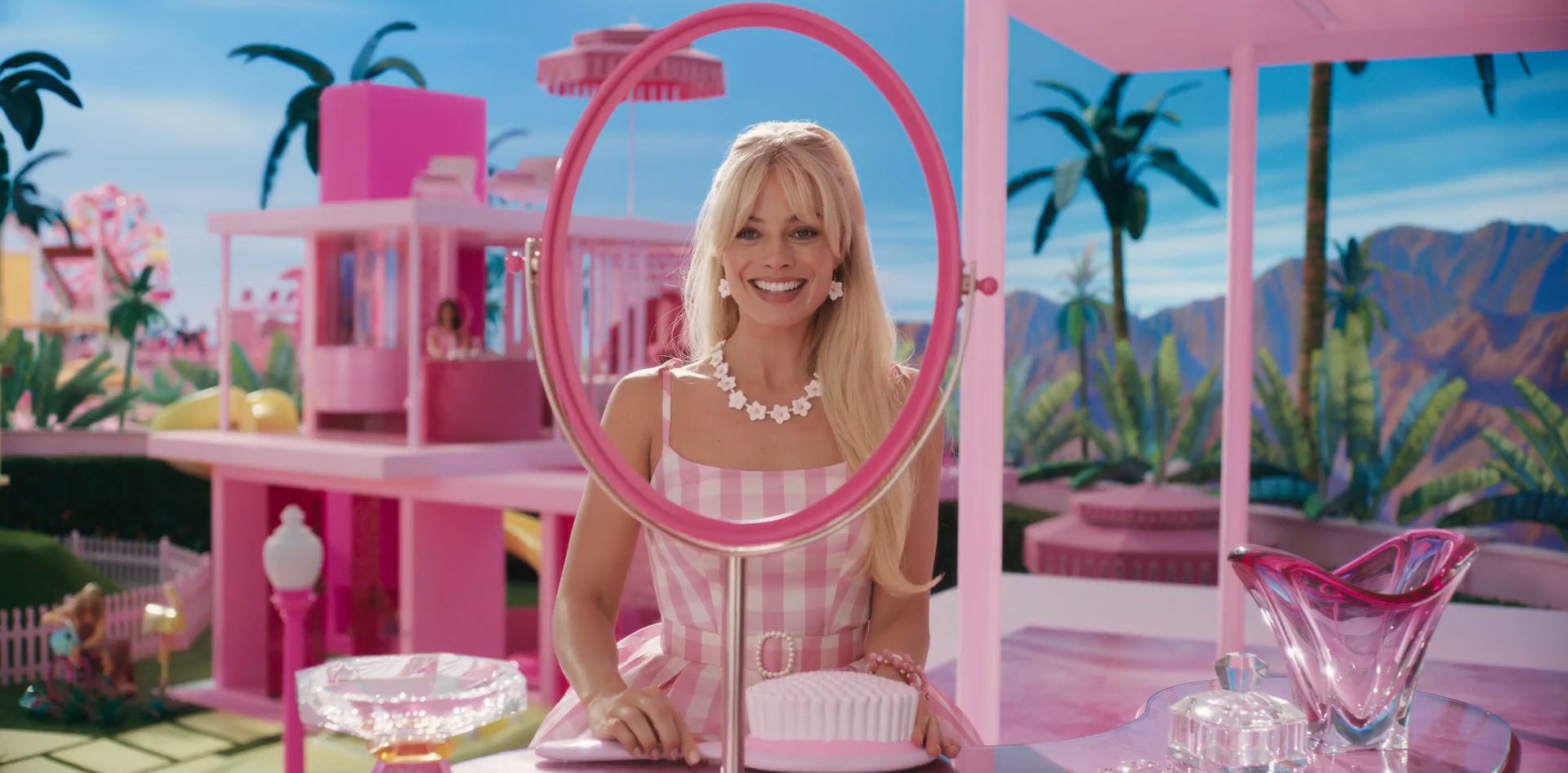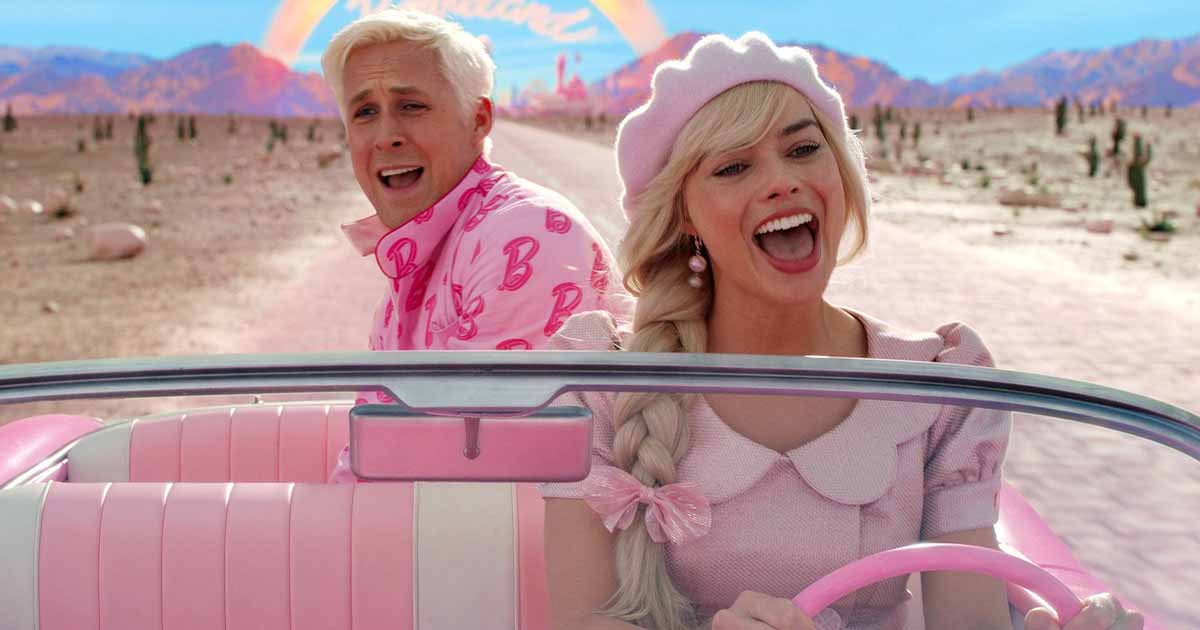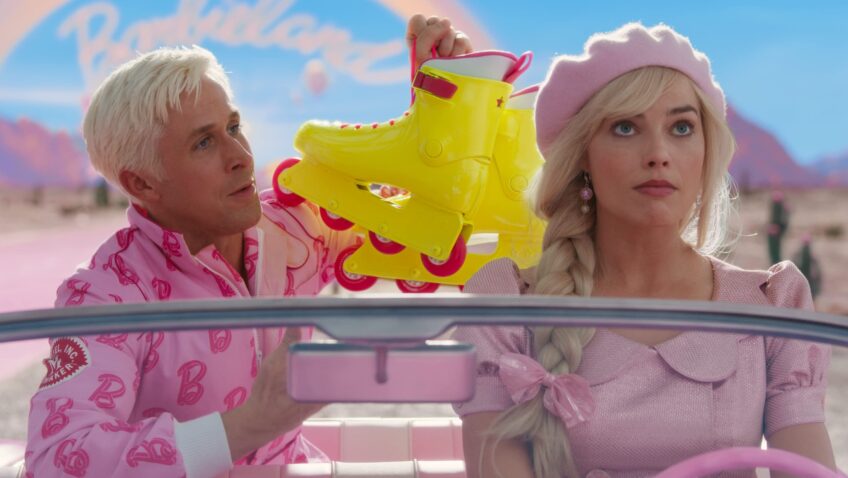Joyce Glasser reviews Barbie (July 21, 2023) Cert 12A, 114 mins.
The prolific Australian actress Margot Robbie turned producer in 2017 with I, Tonya, in which she also starred as ice skating champion Tonya Harding, a female reprobate who is both devilishly appealing and vulnerable enough for us to see her life as a tragedy. Robbie is now the producer of the much more ambitious Barbie in which she stars as the eponymous doll who is similar to Tonya, but a lot more famous. Robbie persuaded the former ditzy, low-budget actress turned powerhouse writer-director Greta Gerwig (Little Women) to transform a doll, whose story is usually in the imaginations of prepubescent girls, into a burgeoning feminist on a voyage of self-discovery.
With some laugh-out-loud jokes, Barbie is cleverly and imaginatively shot by Rodrigo Prieto (The Irishman, Brokeback Mountain) and brilliantly acted by Robbie and Ryan Gosling, yet it entertains and disappoints in equal measure. What’s missing is a coherent story and a visual structure to support the half-baked idea of a human-doll interface between Los Angeles (and elsewhere?) and a place called Barbieland.
Yes, we’ve all heard of Barbie. But most of us – the film is not geared to kids who still play with dolls – made our peace with Barbie years ago. Like young schoolgirl Sasha (Arian Greenblatt) in the film, we haven’t thought about the original Barbie for a long time. Mattel quickly caught up with the times with racially, physically and professionally diversified “aspirational” dolls but these are ignored in the film. Gerwig focuses on the white, uneducated, body-perfect “stereotypical” Barbie of 1959.

Barbie gets off to an inspired start with a humorous prologue, narrated by Helen Mirren, set on a rocky moonscape bathed in earth colours with music from 2001: A Space Odyssey to match. ‘Little girls have always played with dolls, but they could only be mothers. This was fun for a while…’ Mirren tells us as though reciting a bedtime story. We see sad little girls performing household chores. Suddenly we get our first look at Robbie’s Barbie, towering above her ancestors in a 1950’s bathing suit, high heels and red lip stick, like Venus emerging from the sea.
As the little girls start smashing their porcelain babies on the rocks, Mirren, her voice soaked in irony, goes on: ‘Yes, Barbie changed everything…Thanks to Barbie all the problems of feminism and human rights are solved.’
Now you know what you’re in for. A film that disingenuously pretends to nip at the hand that feeds it (Mattel), while they are churning out millions of not-yet-sustainable plastic dolls and clothes before the film’s release. The film is part of a huge merchandising strategy, seemingly aimed more at the parents than the children.
Cut to pastel pink plastic-fantastic Barbieland where everything is perfect, if you consider conformity, repetition, mindless chat and platonic dance parties perfect. Shot in a deliberately artificial, exaggerated manner, Barbie awakens in her luxurious (but transparent) house, takes a waterless shower, dons a late 1950s outfit, and goes through the motion of eating breakfast and drinking (there is no liquid) coffee before jumping off the balcony into her pink and white Barbie car waiting below.
But after we’ve seen this routine enough to get the point, (the only thing that changes is the outfit) something happens. Barbie feels the first signs of existential angst. She is troubled by thoughts of death. Worse: her feet are not arched to slide into high heels, but flat. She confides in the other Barbies. She must visit Weird Barbie (Kate McKinnon), a doll whose body displays the ravages of an overly aggressive human.

Weird Barbie’s diagnosis is that something has changed with her human owner, if that’s the right word, as this is not Toy Story. She has to travel to L.A. to find the girl. Barbie protests, ‘I’m not Adventure Barbie; I’m Stereotypical Barbie!’ Weird Barbie retorts, ‘Don’t blame me, blame Mattel! in one of the “subversive” lines.
Barbie puts a brave face on her journey looking forward to dazzling L.A. and imagining throngs of grateful girls thanking her. Hiding in the back seat of her pink and white stripped upholstered sports car is Ken, who is only allowed to accompany Barbie when he displays his roller blades.
Roller blading on today’s Venice Beach in their 1950s attire, the duo enter the fish- out-of-water section of the film. The couple catch everyone’s attention but not in the way Barbie expected. This becomes apparent when she meets schoolgirl Sasha, who thinks she’s a professional bimbo. When word reaches Mattel that the personification of Barbie is running around L.A. the CEO (Will Ferrell) narrowly avoids a heart attack. When his plan to get Barbie back in the box fails, he leads the male board (in 2023 it is diversified) to Barbieland.
As for Ken, while learning he’s as unqualified for any job in L.A. as in Barbieland, he discovers the word “patriarchy,” and, in arguably the freshest part of the film, runs with it: back to Barbieland. Gosling is far too old for the part, but in this section, it suits the male backlash campaign. ‘He’s just Ken’ is nothing without Barbie but the big reveal is that she is not interested in him. Ken wants revenge. Wearing a white fur coat over his bare chest, Ken turns into an Andrew Tate figure, and persuades all the frustrated Kens of their superiority, with Ken moving into Barbie’s house.
The tenuous idea that Barbie’s thoughts of mortality are connected to a human – it turns out to be Sasha’s mother Gloria (America Ferrera), a feminist designer at Mattel, and not Sasha – are never explored or made plausible. And what about Ken? There’s no human equivalent for him when he is reprogrammed on his Andrew Tate rampage. Gloria and Sasha and the Mattel executives make the long trip to Barbieland as though it were a real place, even though there is no food or real life.
While much is made of Gerwig’s (and her co-writer partner Noah Baumbach’s) subversive touches, such as bringing back dolls Mattel discarded as marketing mistakes (i.e. pregnant Madge and Ken’s effeminate friend Allan (Michael Cera), this is historic and we’ve all moved on. The tone of the film is so self-aware that you feel like Gerwig is winking at us in a self-reverential way.
An inspired touch is the appearance of the ghost of Ruth Handler (Rhea Pearlman) the powerful Mattel businesswoman who created Barbie. But when Ruth sends her unhappy creation into the mortal world, like Wotan does with Brünnhilde, the idea of Barbie’s gynaecologist appointment just sounds creepy.




